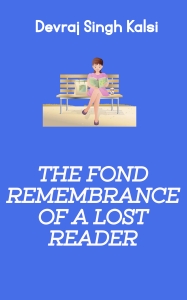
The author is worried. His new novel sold one copy less than the previous novel. Doubts spiral even as he tries to address the impact of this loss by raising the hope of getting the lost reader back. Forget searching for loopholes in the marketing plan. He thinks of possible flaws in his last novel that made the reader decide never to return to his fiction. Is it wise to expect the return of a lost reader?
Maybe a former lover stopped reading him, or a relative got upset with the portrayal of a fictitious character with similar personality traits in his last book. Probably his ex-boss could not gulp the pulp the author made of his office staff with lengthy passages of saucy disclosures. These are usual suspects from his real world, and the lost reader is probably one of them. But why put them under suspicion? The lost reader could well be a stranger. Yes, why not?
The arrival of the royalty statement confirmed that this new novel sold one copy less. The previous novel, in its first year of release, sold a copy more. The loss was marginal in financial terms. But he could not adjust to this loss in his mind. Losing one reader wreaked havoc. He looked out of the window at the blue sky and then closed his eyes to park his mind in the shimmering blue ocean, in his favourite holiday spot. The optimistic vision did not fade the pervasive gloom enveloping within. He wanted to create a state of mind where the blue waters and the blue sky merged beautifully on the distant horizon. The ship of anxiety had to be anchored or he could sink into stygian despair for days and weeks. With the great tidal force lashing him within, he threw his eyes wide open ? to assure himself this was not the beginning of his end as a popular author.?
There was no way of ascertaining the identity of the lost reader to understand why this loss occurred in the first place. He should abandon this madness right away. But he began to blame himself for not exercising restraint. His last novel had a character similar to his former girlfriend. He made the character speak dialogues quite similar to the kind his former girlfriend uttered. This veiled assault on her sensibilities was why she did not read him now. Next in the line of suspicion was his ex-boss who loved his writings even though he did not like him as an employee with spine. In the previous novel, he had caricatured him and painted him as a pot-bellied debauch. He added spice to make the character lively and interesting and this perhaps was the equivalent of crossing the line. In case he had read that novel, he must have decided never to read his work again. The juggernaut of suspicion had a trailblazing run, crushing several characters under its wheels, from his landlord to the schoolteacher, to the tribe of jealous relatives.?
Having exhausted the possible suspects from his inner circle, he began to think of a stranger perhaps offended by his explicit prose and the lack of sensitivity for female characters. Perhaps a woman reader decided to be careful in her choice of books and authors by eliminating this wordsmith from her reading list. He continued to think there was something improper and inappropriate in his previous book, and he was suffering because of that, just like suffering for past misdeeds.?
Aside from content, he began to think something was wrong with the ending. It was abrupt, a sharp and ruthless cut. But he promised to write a sequel and make amends. However, his new novel was not a sequel. This betrayal could well be the reason for losing a reader. A reader expecting a sequel felt let down and he decided not to read him. This was a plausible reason. He would have also done the same thing under such circumstances.?
Next in his line of suspicion were form, technique, and style picked up at random. Something magical was perhaps missing, or the stuff was too experimental, a step into a new genre that his committed readers were not expecting from his pen. Since he wanted to showcase versatility, he went ahead with a new genre, and this could have annoyed a reader. Well, it is likely. But in such a case he should have lost not one but several readers.??
He looked carefully at the book cover again and found it vanilla stuff vis-?-vis the gorgeous cover of the last book. An ordinary cover resulting in the loss of one reader was also not convincing. Many readers judge books based on covers. Did he have just one such reader??
His last novel had probably fetched him a literary reader who picked it up because it was promoted as literary fiction instead of general fiction ? since the editor found literary merit in it. The blurb also emphasised it. An international author called it a tour de force. When the literary reader picked it up, most likely he felt let down. But again the same question: why lose one reader less for such a transgression? He indulged unsparingly in examining the inherent flaws but a futile search left him distraught. He concluded it was beyond his imagination to locate the exact reason for the loss.
Soon after the deep dive, he emerged stronger, ready to construct a new narrative of hope. No, nothing is wrong with the novel per se. Perhaps the lost reader is someone dead. One reader popped off in the two years of the pandemic. It is possible. If the death factor sounds unconvincing or forced, why not imagine that one reader is lost because he is unable to read due to loss of vision? Or, maybe the lost reader is not actually lost. He is simply far away, marooned on an island, where books are not accessible. When he returns, he will, in all probability, order it. Such a panglossian spray drives away the odour of gloom.??
After indulging in this exercise, he took a keen look at the royalty statement before keeping it in his drawer. He retired to his comfy king-size bed with a faint smile pirouetting on his chapped lips, glowing with inner peace mirrored on the puckered face. He was glad he was thinking deeply about one reader, of one less copy sold. His introspection assured him he was taking pretty good care of his readers by showing genuine concern instead of simply taking the shortcut to stay upbeat, by simply thinking that his forthcoming novel would sell one copy more than his new novel.?
About the Author







Comments